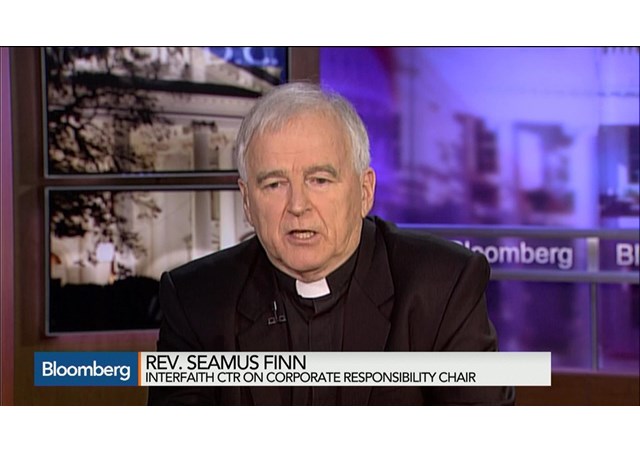
'Impact investing needed for sustainable help to poor': Fr. Séamus Finn, OMI

(Vatican Radio) Pope Francis at his Angelus address on 29 June for the solemnity of Saints Peter and Paul prayed for participants in the Impact Investing Conference 2016 which took place in the Vatican on 26-28 June.
The Holy Father said, “May private investments, united with those of the public sector, favour the eradication of poverty among so many emarginated people”.
The three day conference hosted by the Pontifical Council for Justice and Peace, in conjunction with Catholic Relief Services, carried the title "Making the Year of Mercy a Year of Impact for the Poor".
Fr. Séamus Finn, OMI, is Ethical Advisor for the OIP Investment Trust - which provides professional faith consistent investment management of the financial resources of Catholic organizations - and was a presenter at the conference. In an interview with Devin Watkins, Fr. Finn spoke about the need for a new way to the help the poor in a sustainable fashion.
Listen to the full interview:
Fr. Séamus Finn said his presentation at the conference sought to explain the how the OIP Investment Trust, or 'Oblate Fund', utilizes its capital to invest in impact funds or projects aimed at helping the poor.
Chicken, beef, or bank?
As part of his presentation, Fr. Finn gave three examples of impact investments made by the OIP Fund through intermediaries within the last eight years.
The first example he gave was a poultry farm. "Through Eight Miles Fund, we just put some money into a poultry farm in Uganda that is now gearing up to respond to the appetite that Ugandans have, given their disposable income, to eating more meat in their diet in terms of nourishment, and chicken is often one of those things."
A beef export project in Ethiopia was his second example of the usefulness of impact investing. He said it "was a very small project, but with the injection of capital it was enough so that those who were doing the project [could] buy more cattle, improve their record of caring for the cattle they have - better farming techniques, better safety - which, without the capital, they would have been slowly inching along over a longer period of time"
Lastly, he expressed his passion for the OIP's investment in a Ugandan bank. "I happen to be pretty passionate about the role of banks in the world, whether it's in Africa or in New York. From the dawn of time human beings have been trading with one another and doing financial transactions and commerce - we weigh things and then pay for them." For Fr. Finn, that's why money, lending, and insurance are important aspects of every person's life.
Church response to increasing needs
Fr. Finn said there despite impact investing being a new field for the Church, many dioceses or religious orders could sustain their charitable giving to the poor with a business model involving impact investing.
"It's not like buying government bonds, it's not like buying traditional equities, or like putting money in the bank. It's investing with a specific purpose in mind that has broken out in different parts of the financial world over the last 10 or 15 years."
He said there is an increasing need for many Church institutions to "become more sustainable in many corners of the world and not just in the developing world. The Church has always lived on donations and collections, and that's a really important part of how the Church and we support the work that we do. But there is also this whole other discussion at the moment of 'is there a way the Church can take the buildings they have and the land that they own, and maybe use it that is more involved in the community and is also generating some income to support the work of the Church."
Creating a bond
Fr. Finn also noted the ambivalence of the charitable relationship. Despite recognizing that there will always be a need for charity, he questioned whether there might be other vehicles to help people besides traditional ways.
"The question is that, if you give somebody something without any strings attached or they don't have to pay you back or they didn't work for it, there's always the suspicion that they don't feel like they earned it and they don't appreciate it. So they are kind of casual about the way they use it. And it doesn't ennoble, it doesn't respond to their dignity as human beings. So what if I lend you money and you have to pay me back. Does that develop an ongoing relationship? So it's not like I gave you the hundred dollars and now go away, and I'll never see you again, because there is a bond that's created."
| All the contents on this site are copyrighted ©. |


